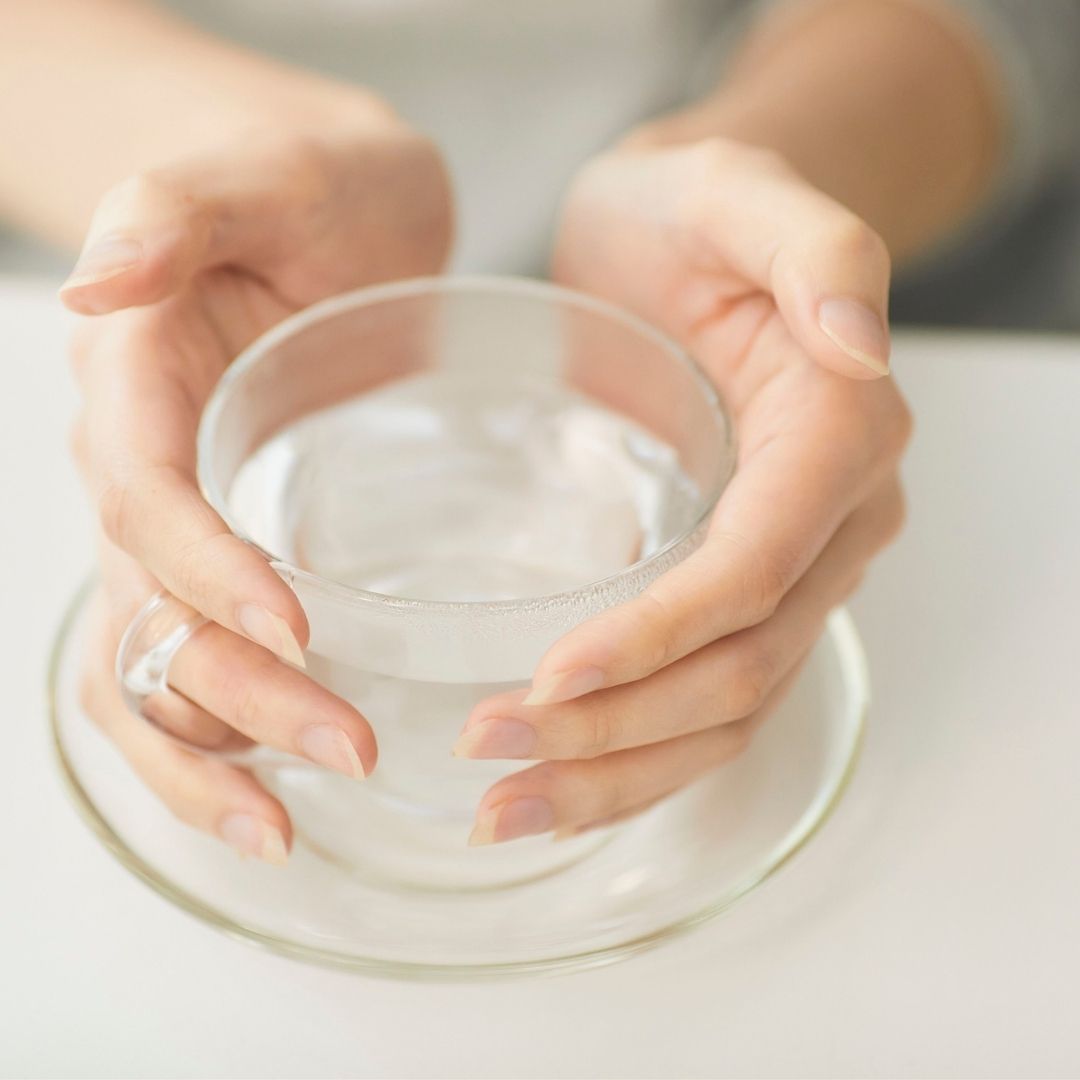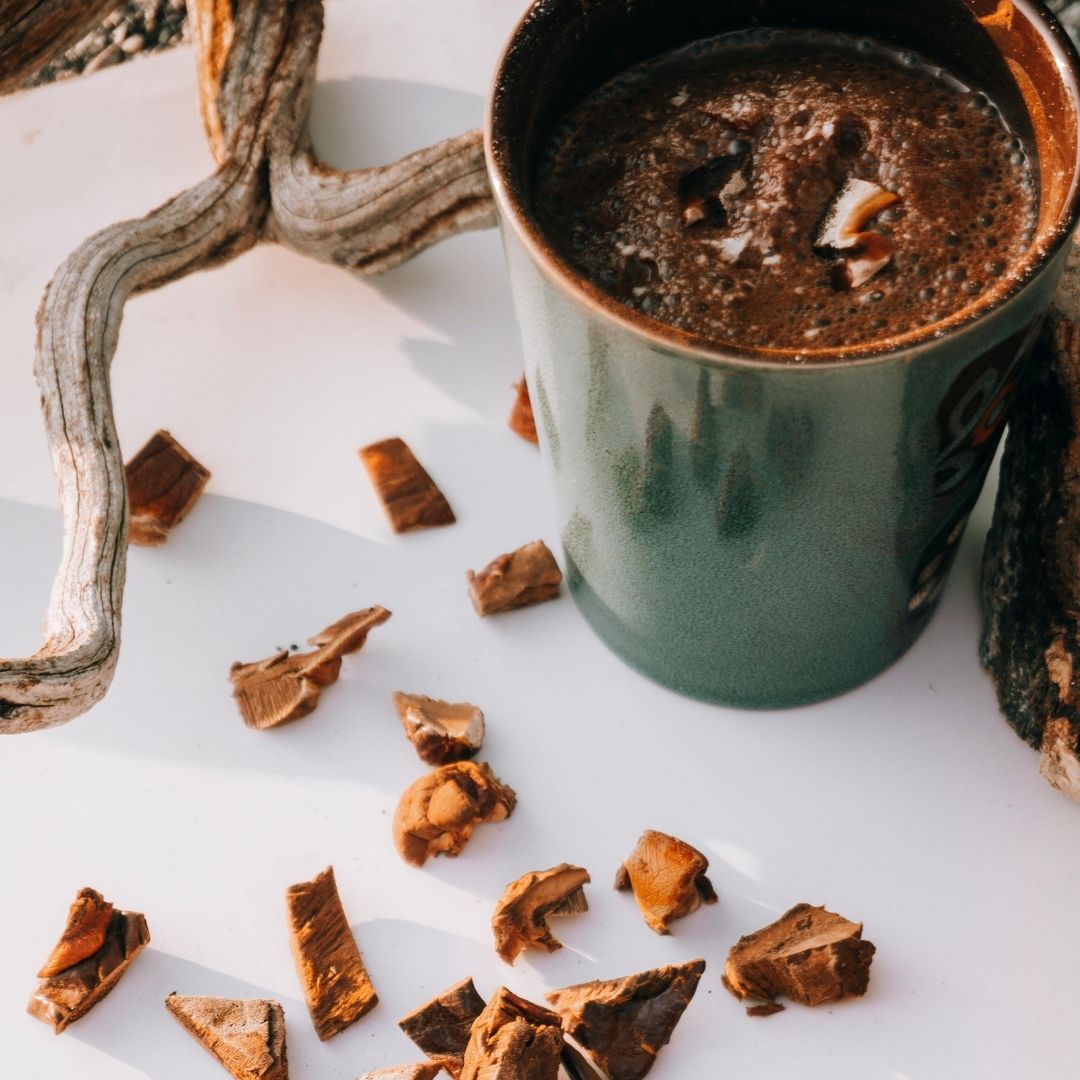If you've ever found yourself struggling to do up your jeans or feeling uncomfortably puffy in the days before your period, you're far from alone. Bloating and water retention are two of the most common symptoms of the menstrual cycle. For many people, that tell-tale sense of fullness, tightness, or puffiness can show up like clockwork in the luteal phase, often peaking right before menstruation begins.
But why does it happen? And what can actually help?
The science behind bloating
In the first half of your menstrual cycle, oestrogen begins to rise. While its main role is to help thicken the uterine lining, it also affects how your body handles fluid. Oestrogen signals the kidneys to hold on to sodium, which in turn leads to water retention. This is why you might start to feel a little puffy or swollen mid-cycle, often in the hands, ankles, or lower abdomen.
After ovulation, progesterone steps in. This hormone has a mild diuretic effect, helping the body release some of that stored water. For a short while, this shift can bring a sense of relief. But as progesterone levels drop in the days leading up to your period, that effect disappears. The result is often a noticeable build-up of fluid and a return of that heavy, bloated feeling.
At the same time, prostaglandins (hormone-like compounds released around menstruation) rise. While they help trigger the uterine contractions needed to shed the lining, they also increase inflammation and encourage fluid to collect in tissues. This adds to the bloating and discomfort.
Changes in sodium balance can worsen the picture. Oestrogen can increase aldosterone, a hormone that tells your kidneys to retain even more salt - and more salt means more water. If you’re also eating particularly salty or processed meals, that can also have an impact.
Digestion also tends to slow down in this phase. Prostaglandins and stress can both reduce gut motility, leading to trapped gas and constipation. Cortisol, your stress hormone, further complicates things by affecting both digestion and fluid balance. So, in the lead-up to your period, the combination of hormonal shifts, slower digestion, and heightened stress can make bloating feel much worse.
What to avoid
- A high sodium intake (think salty snacks, ready meals, or restaurant food) can increase fluid retention.
- Excess sugar and caffeine may spike insulin and cortisol levels, which can disrupt digestion and fluid balance. Why not switch to Matcha or Ceremonial Cacao? Find out why your body will thank you in this blog post.
- Carbonated drinks can increase gas in the gut and lead to bloating.
- Dairy products may irritate the gut in people who are sensitive or lactose-intolerant.
- Lack of movement slows circulation and digestion, both of which can make bloating worse.
- Chronic stress affects the nervous system and hormone balance, creating a perfect storm for fluid retention and digestive disruption.
What can help
- Eat More Magnesium and Potassium-Rich Foods - Magnesium helps to reduce fluid retention and support muscle relaxation, while potassium encourages the body to release excess sodium and water. Leafy greens, bananas, avocados, sweet potatoes, and dark chocolate are great options.
- Prioritise Fibre - Eating enough fibre helps to keep your digestive system moving. Whole grains, legumes, fruits, and vegetables can all support regular bowel movements and reduce gas build-up.
- Stay Hydrated - It may sound counterintuitive, but drinking plenty of water helps flush excess sodium and supports kidney function. Hydration can actually reduce bloating, not make it worse. I recommend adding a pure, unflavoured electrolyte complex to water to increase your body’s absorption - my preference is Oshun.
- Cut Back on Trigger Foods - Try to reduce your intake of high-sodium foods, carbonated drinks, and processed sugars in the days before your period. This can help your body maintain a more stable fluid balance.
- Support Your Gut - Fermented foods like yoghurt, kefir, sauerkraut, and kimchi contain natural probiotics that can support digestive health and reduce bloating over time.
- Try a natural multivitamin to aid digestion. I recommend Soov’s Deflate multivitamin.
- Move Your Body - Even a short walk can help stimulate digestion and improve circulation, both of which help reduce bloating and water retention.
- Get Enough Sleep - Lack of sleep can raise cortisol levels and disrupt your hormonal balance, which may worsen bloating and PMS symptoms. Aim for 7-9 hours of quality sleep each night.
Targeted Hormone Support with Soov
Soov is a beautifully formulated range of women’s health supplements that I recommend to clients seeking natural support throughout their cycling years, into perimenopause and beyond. Created by women, for women, Soov was designed to help with the kinds of symptoms that many experience each month - like low mood, cravings, bloating, and cramps - but that often get brushed aside.
What I really appreciate about the range is that it’s rooted in a real understanding of how our hormones shift across the cycle, and each product is thoughtfully put together with ingredients that actually make sense - like magnesium for cramps, adaptogens for stress, and botanicals to support mood and energy.
To help you get the most out of Soov, I’ve created a simple guide below. By combining and layering products in tune with your body’s needs during each phase, you can experience more targeted, lasting relief, whatever symptoms you're navigating.
Soov Deflate for Bloating and Puffiness
Deflate is your go-to formula for easing bloating, supporting digestion, and relieving puffiness. It's packed with natural diuretics, carminatives, and enzymes that work together to reduce discomfort, especially in the lead-up to your period.
Key Ingredients:
- Dandelion & Burdock – Gentle natural diuretics that help flush out excess water
- Peppermint & Ginger – Soothe the gut, reduce gas, and ease digestive cramps
- Papain & Bromelain – Digestive enzymes that assist protein breakdown and minimise gas build-up
- Chloride – Supports the production of stomach acid, aiding smoother digestion
When to use: Ideal during the late luteal phase (Days 21–28), or whenever bloating and puffiness flare up.
Your PMS game plan
Here's how to pair Deflate with your daily Soov base formula and optional symptom-specific support to target bloating and fluid retention more effectively.
If Ova is your base
Focus: Blood sugar balance, insulin sensitivity, and fluid regulation
- Add Deflate – For bloating, puffiness, or sluggish digestion in the premenstrual phase
- Add Crave – If bloating is accompanied by carb cravings or energy crashes
- Add Vibes – If bloating contributes to mood swings, irritability, or anxiety
- Add Ouch – For cramps, inflammation, or general bloating discomfort
Suggested stack: Ova daily + Deflate from Days 18–28. Add Crave, Vibes, or Ouch as needed.
If Flow is your base
Focus: Emotional PMS support and mild hormonal regulation
- Add Deflate – For moderate bloating or fluid retention before your period
- Add Vibes – If bloating increases emotional sensitivity or overstimulation
- Add Crave – For premenstrual cravings or afternoon energy dips
- Add Ouch – For cramping or discomfort linked to bloating
Suggested stack: Flow daily + Deflate during the luteal phase. Layer in Vibes or Ouch depending on mood or pain symptoms.
If Endo is your base
Focus: Oestrogen dominance, heavy bleeding, and inflammation
- Add Deflate – Complements Endo by supporting fluid clearance and easing digestive sluggishness
- Add Vibes – If breast tenderness and bloating are accompanied by emotional volatility
- Add Ouch – For cramping, full-body inflammation, and discomfort associated with heavy periods
Suggested stack: Endo daily + Deflate from Days 21–28. Use Ouch for pain relief and Vibes for emotional regulation.
If Meno is your base
Focus: Perimenopausal bloating, irregular cycles, and fatigue
- Add Deflate – For hormonal puffiness or slower digestion mid-cycle or premenstrually
- Add Crave – If bloating comes with emotional eating or sugar cravings
- Add Vibes – For low mood, stress reactivity, or mental fatigue
- Add Ouch – For abdominal bloating, cramping, or general premenstrual aches
Suggested stack: Meno daily + Deflate as needed during the luteal phase or when bloating appears mid-cycle. Add symptom-specific support depending on how you feel.
Summary: Soov Bloating & Puffiness Stack Cheatsheet
.jpg)
If you’re struggling with PMS or menstrual symptoms of any kind, and would like some expert advice, please don’t hesitate to reach out. You can book a confidential quick consult with me here for an immediate discussion, or opt for the Liebling Health Hormones Package (call or email based), for personalised nutritional and lifestyle guidance over four sessions, in addition to any targeted supplements.
.jpg)

.png)

.jpg)
.jpg)
.jpg)
.jpg)

.png)
.png)

.png)
.png)



